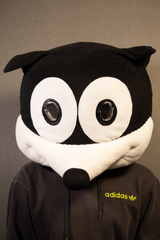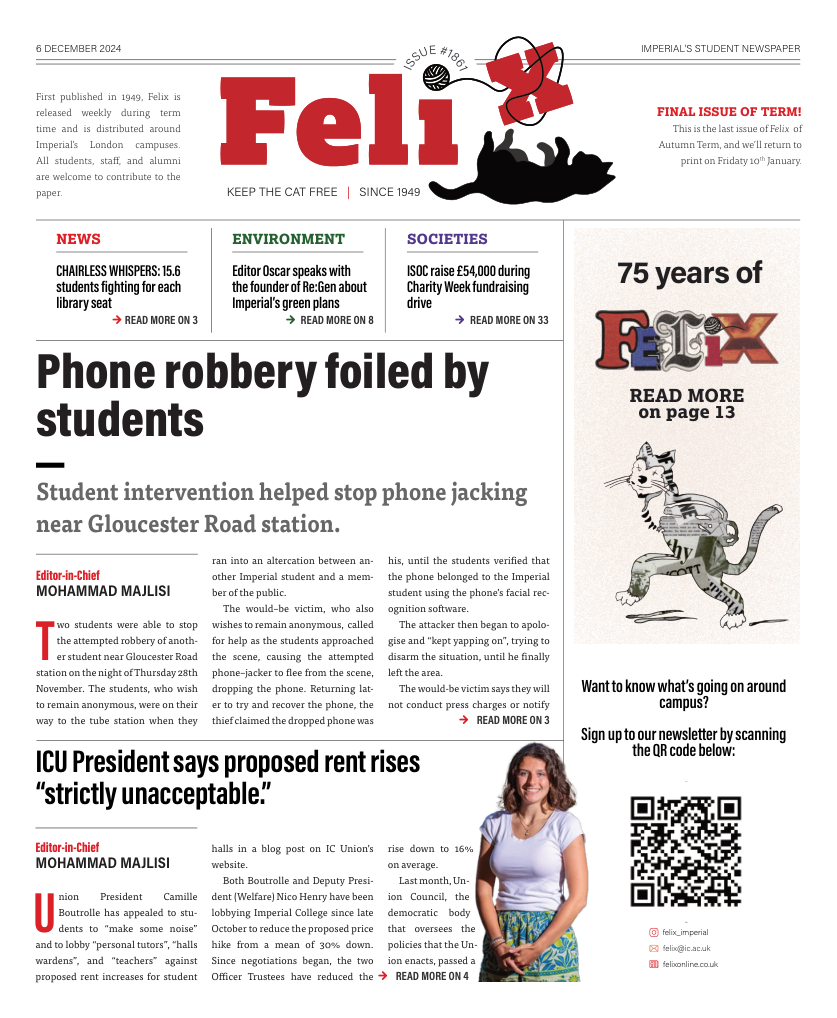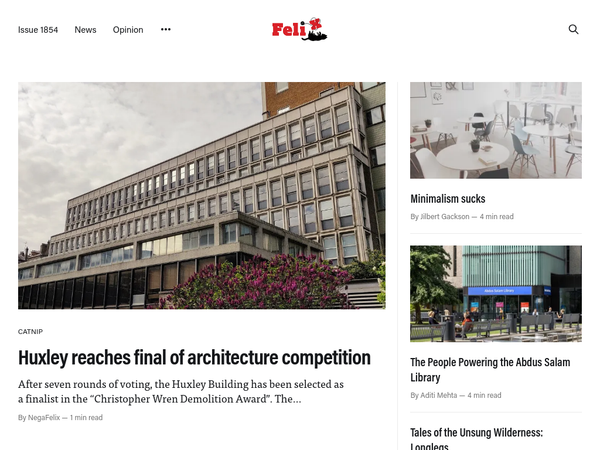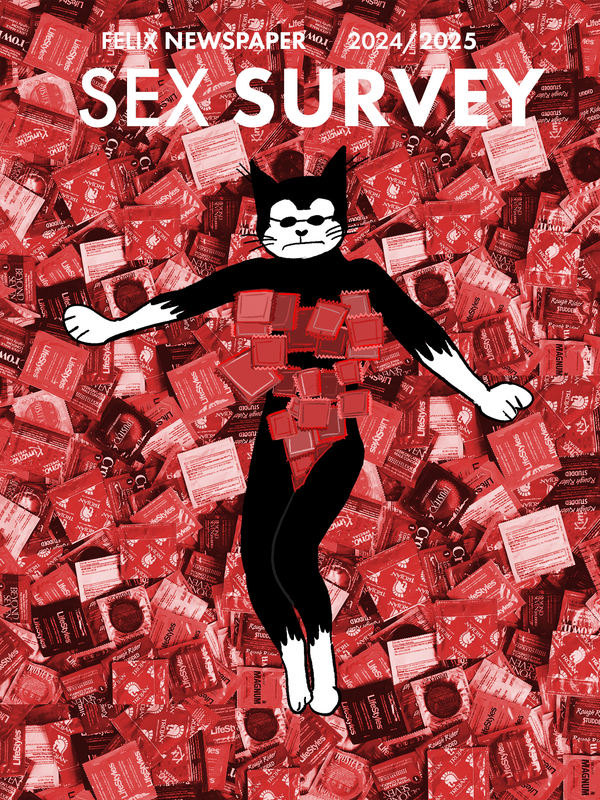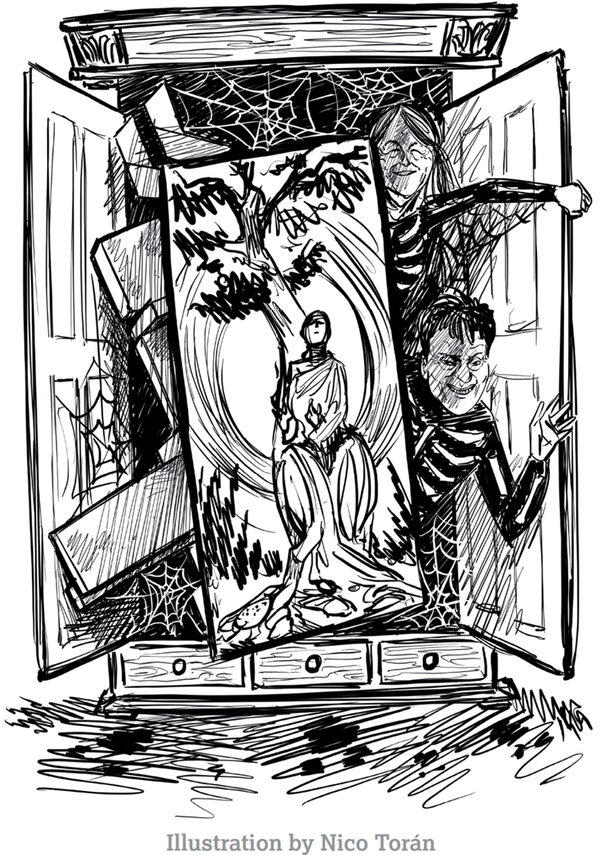What does it mean to be a Felix Editor?
I had a little game-plan for my editorials this year, and for my year as editor as a whole. I knew the 75th Anniversary was coming up, and so I wanted my year to be a return to Felix form, in a sense. We've had some fantastic editors over the years, not least my predecessor Jamie who undoubtedly led a Felix renaissance. Last year was not just a return to form, it was Felix at the very best it could be. This year, in part, is a celebration of what Felix is and was. I wanted to return to the origin of the paper, and returning to the editorial of that first issue in December 1949, I wanted to make my tenure as editor a year of “a frequently published journal to comment upon the affairs of the College whilst they are still topical, and to bring to the attention of its members the activities of Clubs and Societies of which people at present know little, and knowing little, tend to care even less." I think we have been doing a pretty good job here in the office.
I hope you've enjoyed reading the three or so pages I have weekly for news. Food and Societies are doing well, and I'm extremely proud of Charlie, the editor of these sections, for putting in the work on top of her own, arduous, final year studies to ensure that those sections are to a high standard. This is not to say the other editors haven't been pulling their weight — I'm immensely proud of the output of our entire team, and the commitment they have shown to prepare every section weekly for the past term. Shout-out Ruby and Juliette for smashing out the illustrations, back covers, and graphics. Another great achievement, due to Timothy Langer, our Senior Webmaster, is to have released our new website: it's in fact our third website and replaced our old online edition which was made live in 2020. It's never been easier to publish our articles online, and this is due to the efforts of Timothy, who has gone above and beyond to maintain our old servers, and is also working on something exciting right now...
On websites, we have been online since 1996, on the cutting edge because we are Imperial's newspaper, and Imperial is always on the cutting edge. It's been redesigned and revamped more than a few times and migrated twice. I believe our current set up will last a while. It's modern, modular, and easy to maintain for students who want to get some web development experience (I know what you are CV warriors).
You're allowed to make mistakes, allowed to figure it out. Felix is to my knowledge, one of the only, if not the only, weekly university newspaper still operating in the UK. We do our best, with our small editorial team of only 15: a fraction compared to the majority of the top-tier of student rags, who have massive editorial teams and writers (read humanities students) but we are doing well. I'm also pleased to see Imperial's first years rising up to the occasion and joining our team. I have no doubt that I am working with future editors, and perhaps editors-in-chief, who will ensure our humble newspaper thrives in the years to come.
So, what does it mean to be the Editor-in-Chief?
Well, firstly, it's an amazing gig. As well as news, I organise the running of the paper, and ensure my editors are supported as much as they can be. I don't believe there isn't a section I haven't worked with yet, whether it's help with writing, editorial guidance, or general support for them all. I may have contributed an article or two to a few sections, but I don't write and tell. It's great work, and I love it. There's nothing quite like landing your dream job so young, and I will cherish the time I have.
It's changed me, too. I've enjoyed the praise (please send to felix@ic.ac.uk) and even the mistakes, issues and problems I've run into. Shit doesn't work out, but it's great to have that chance to pick yourself up and learn from it.
I love news-writing: I didn't intend to be a news journalist, and only got into it last year when I pitched some news stories to the then Editor-in-Chief. I've learnt a lot from his mentorship, and I owe my position now to him. There have been opportunities and situations, even now as a lowly uni journo, that I am so grateful for, because of the decisions I took last year.
But I suppose it doesn't really answer what it means to be editor in the widest sense. Looking back, across editorials prior, it's always been a fun job. The feeling is ubiquitous. But the stress is also ubiquitous. Ever since we moved to weekly print, we, as editors, have all felt the stress of working overtime often enough, of being receptive and available at all times to answer the questions, queries and challenges our teams raise, and the dread of copyediting, which isn't necessarily the most fun job, but it is nice in its own way. I do enjoy it, when I have opportunity to do so, and I would encourage people who have an eye for detail, a keenness to learn, and free time on Wednesdays and Thursdays to come in to help us out. We've had up to 12 people copyedit for us this year so far, and we will always welcome more.
There is a sense of camaraderie in Felix: I know many have walked the path I am now on, in worse conditions. Due to the nature of Felix, teams change very rapidly, and the abilities of our team vary on when they have joined, and who trained them. There was a significant sense of continuity between the years 2020 to 2024, as we had a few years of excellent editors who worked hard to keep the paper in the stage it is today. By the time my year ends, there will be only two or three people remaining from that era, and it has in fact already passed.
I view my tenure as a break from the old team, as six or seven of us remain from the era preceding us. By the time my editor year ends, I will be the oldest member, and most experienced still remaining here Felix.
It is no longer the post-COVID era, but instead a time of rapid change and renewal as Imperial and students change strategies and perspectives. Writing is harder than before, maintaining a readership is difficult as we compete with a generation raised on social media and with less interest in extra-curriculars, and perhaps a disdain for the hallmarks of liberal democracies: note how the Labour, Conservative, and Liberal Democrat societies died out. Despite this, Felix will survive: the first years who have joined are very keen and capable, and I'm sure there are plenty of students who will join our team. Maybe we will shrink, maybe the output of Felix will change, but the cat will be kept free one way or another.

